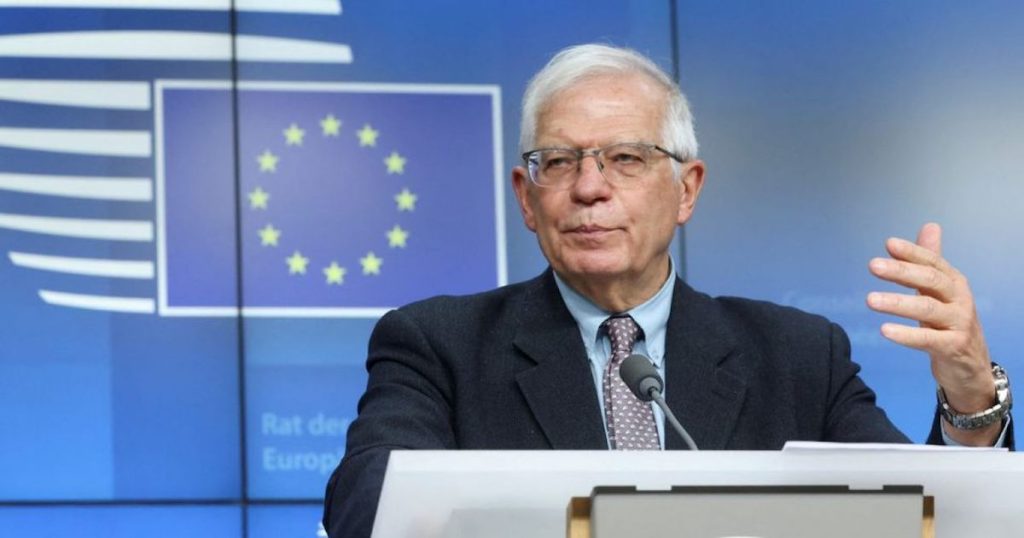'Candidate status must be earned by implementing reforms' - EU diplomatic chief
Josep Borrell on reforms in Georgia
The EU High Representative for Foreign Affairs and Security Policy Josep Borrell stated during his official visit to Tbilisi that Georgia’s candidate country status must be earned through serious reforms and respect for EU values and Georgia still has a lot of work to do in this direction.
As Borelle explained, the EU doors are open for Georgia, but the country has to fulfill all 12 established recommendations, which will improve first of all the quality of life of Georgian citizens.
“Georgia is an important part of the European Union and now is a crucial period in choosing your future, because in a few weeks we will discuss the next steps for Georgia’s accession to the EU and for the first time we will present a report on Georgia’s progress as a candidate country.
The door to the EU is open and we want to support you on this path. But at the same time we have to say that applying for EU membership is a serious step. Candidate status has to be earned by serious reforms and respect for EU values. Frankly speaking, there is still a lot to be done in this direction,” Borel said.
According to him, in the case of Georgia, there are 12 priorities that need to be fulfilled. And not to “make Brussels happy” or to satisfy EU member states, Borrel emphasized, the recommendations should be implemented in order to improve the lives of Georgian citizens.
“I have seen many EU flags in Tbilisi and I know that 80 percent of Georgian citizens support the country’s accession to the EU. I would like to thank everyone who supports Georgia’s European future. Joining the EU is a national task and everyone must work together and constructively. Unity is more important now than ever. Georgia should utilize the short time left and carry out basic reforms,” Borrel noted.
- “Georgian authorities are trying to prevent the country from obtaining EU candidate status”
- Charles Michel: EU and accession candidates must be ready for enlargement by 2030
Before his visit to Georgia, the head of the EU diplomatic mission spoke about Georgia-EU relations in an interview with Civil.ge.
Borrel touched upon such issues as the prospect of granting Georgia the EU candidate status at the end of this year, the impeachment process of the Georgian president, as well as the compatibility of Georgia’s foreign policy with the EU.
Candidate status
“The extensive report presented by the European Commission in October on Georgia’s fulfilled commitments will be the basis on which EU member state leaders will decide on the granting of candidate status at the end of 2023.
There is little time left before this important decision for Georgia’s future, so we urge the Georgian authorities to seize this opportunity. The outcome depends entirely on Georgia’s merits. I cannot predict in advance what the report will be in the fall. All I can say is that accession is hard work and that fulfilling all 12 priorities is only the beginning of the process.
Undoubtedly, EU enlargement is no longer an area of dreams. What is clear at this point is that enlargement will always be a merit-based process. This means that a country will join when it meets the necessary political and economic criteria.”
Impeachment of the President of Georgia
“For a country to become a member of the EU, it must have stable institutions that ensure democracy and the rule of law.
Unity is more important now than ever. The work done by Georgia can only be sustainable in the long term if the reform program is supported by all political forces.”
Consistency of foreign policy with the European Union
“The steps taken by the government recently may contradict the foreign policy course of the European Union.
We very much regret the government’s decisions regarding the restoration of air links with Russia and the entry of sanctioned persons into Georgia.
We take into account the newly formed strategic partnership between Georgia and China. It is the country’s prerogative to establish deeper ties with foreign partners. However, as Georgia seeks to become a member of the European Union, it must ensure that all its strategic cooperation does not contradict EU policy.
As a country seeking EU membership, we expect Georgia to comply with the EU’s foreign policy decisions and actions.
Georgia’s compliance rate was already low at 44 percent last year, and now it is at 43 percent. This is of great importance to the EU because our foreign policy is guided by consensus. With low support for foreign policy statements (43 percent), Georgia shows that it has the potential to undermine that consensus. And Member States are paying great attention to this.”
- Will the Georgian authorities be able to declare impeachment of the president, and why did they go for it?
- “Ukraine, Moldova, Balkan countries and eventually Georgia will join the EU” – German Foreign Minister
On September 7, European Union High Representative for Foreign Affairs and Security Policy Josep Borrell arrived in Georgia on an official visit. His visit will last until September 8.
Within the framework of the visit Borrel will be received by Georgian President Salome Zurabishvili. The high-ranking EU official will also meet with Georgian Prime Minister Irakli Garibashvili.
The EU diplomatic chief will reportedly take the opportunity to meet with representatives of all political parties in the parliament and hold discussions with representatives of civil society.
According to the European External Action Service, Borrell’s first official visit to the country in his current capacity will provide an opportunity to discuss Georgia’s movement towards European integration, as well as exchange views on broader foreign policy and regional issues.



















